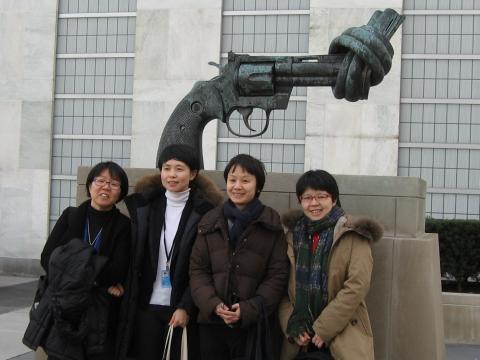
Sunday March 12, 2017 the Cor Unum International English Speaking Novitiate community traveled from our home city Chicago to New York City in order to attend the 61st session of the Commission on the Status of Women. Our second day in NYC began with Cecile Meijer's presentation on “DPI (Department of Public Information) and ECOSOC (United Nations Economic and Social Council) status” in relation to the whole structure of UN system. Cecile’s presentation prepared us to ponder how we could relate ourselves to the various issues we would hear during the Commission on the Status of Women. We learned that with our incarnational spirituality, which is to discover and reveal God’s love, we are committed to look at the wounded world with respect, tolerance, and peace. This is the way we approach various issues around the world to help people live dignified lives. We also learned that this is where our charism and the purposes of the UN converge.
We began Tuesday, our third day in NYC, with a prayer. Sheila Smith led the prayer and guided us to reflect upon the connection between our charism and JPIC ministry. We were supposed to join the UN Commission on the Status of Women on Tuesday and Wednesday, but all the Tuesday events were cancelled due to heavy snow. However, thanks to the cancellation, we had very meaningful and educational discussions that helped us relate to the status of women in the world we would learn from our visit to the UN on Wednesday. In the morning, we watched a film titled Pray the Devil Back to Hell, which chronicles social unrest in the West African Republic of Liberia where civil war has torn the nation apart and left hundreds of thousands dead or displaced. The film reconstructs the way this tragedy galvanized a coalition of Christian and Muslim women to rise up and put pressure on their government to pursue peace talks through nonviolent tactics. We were struck by their grassroots-movement as it led to democratic elections and Liberia’s first female president. Those ordinary and unarmed women brought civil war to an end, disarmed the rebels, and swept the dictator from power. In the afternoon, Sheila shared with us her research on human trafficking of indigenous people in Canada. The stories of the survivors of human trafficking were very powerful. In particular, Sheila’s story about a survivor who became her Goddaughter deepened our understanding of the relationship between our prayer and ministry. It was helpful to watch the movie together, engage with Sheila’s presentation, and learn the importance of paying attention to the sufferings and hopes around the world.
On Wednesday, we were finally able to attend the UN Commission on the Status of Women! Each of us chose two or three events that she found attractive and shared information with each other at the end of the day. Chihiro Yamamoto’s favorite event was a side-event titled “Empowerment of women in rural and insecure areas in Afghanistan.” In the event, she had a chance to know how the government of Afghanistan and India are working together toward economic empowerment and improvement of women’s education in Afghanistan. Through the economic empowerment program that has allowed many Afghanistan women to have tailor training in India, Afghanistan is trying to integrate women living in rural areas to the mainstream of the society. Yuriko Tezuka attended three events related to human trafficking. She learned that human trafficking is widespread all over the world. All speakers emphasized the urgent need to support survivors’ lives by providing them with shelters, vocational guidance and so forth. Miriam Yu found a side-event “Social norms, gender equality and the empowerment of young people” most impressive. She was touched by one of the speakers who is Danish activist, Emma Holten, and kept thinking about how important it is for us to teach teenagers about sexuality, which is getting more serious among young students around the world. Min-Ah Cho found a parallel event called “Cross-Movement Solidarity with Domestic Workers: Economic, Racial, and Gender Justice” most powerful. In the Spanish-English bilingual panel discussion, panelists identified the vulnerability of female migrant domestic workers to the various critical issues, including sexual violence, beatings, confiscation of passports, and non-payment of wages.
We sincerely appreciate the warmest hospitality of the NYC communities and cherish our time in NYC.

